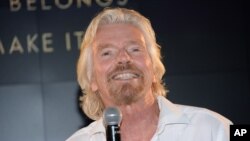When he was a teenager in the 1960s, Richard Branson famously quit high school and, hoping to change the world, started a magazine protesting the Vietnam War. Fifty years later, the billionaire is in Vietnam this week to tell people they can change the world in another way: through private enterprise.
Branson said Sunday at a conference in Ho Chi Minh City that the billions he made after founding Virgin Group, known for its airline and record label, allowed him to finance his philanthropic pursuits. People can find professional success whether they’re nurses or bus drivers, Branson said, but those who achieve success as entrepreneurs have a responsibility to invest their money socially.
“You’ve got to make sure you use that money to tackle problems in your community, in your country,” he told an audience of 7,000 current and would-be business people, some of whom shelled out $3,500 to meet him. That compares with an annual income per capita of $2,000 in Vietnam.
Other tickets cost $25. With interest from thousands of Vietnamese, the self-help business circuit has arrived in Vietnam. Locals regularly talk of working for themselves rather than a big corporation, reflected in the more than 90 percent of companies that are small or medium size. Working professionals at the two-day conference, by organizers MOVE Vietnam, were mostly interested in coming to rub elbows with Branson and learn his so-called business secrets.
Vietnamese already strongly embrace capitalism. Last year a Pew Research Center survey reported 95 percent of Vietnamese agree that people are better off in a free market economy, even if some people are rich and some are poor. No other country polled, including the U.S., showed such overwhelming support for capitalism.
But Branson said he hoped Vietnam’s rising business elite would use their wealth and power for social causes. From education to internet access for the poor, the flamboyant tycoon has pursued a wide range of charity interests. He turned to the global war on drugs, for instance, labeling it a failure because focusing on penalties has not curbed usage. Vietnam, which executes drug smugglers out of a concern for heroin abuse in particular, should join other countries and prioritize medical treatment over incarceration, he said.
“In business, if we find that there’s a different way of doing something, you change your approach,” said Branson, dressed in brown loafers and a black leather jacket. “You don’t continue with the same old way.”
The event was billed as a master class in areas like management, leadership, sales, and wealth creation, which Bui Minh Hao said was the reason he attended. As director of Daicata International, a cosmetics distributor, Hao said the motivational speakers gave him useful lessons in marketing, business psychology, and “how to get rich.”
Hao told VOA News this matters for his country, which now has lower-middle income status, because communist Vietnam is still continuing a transition to free markets that began in the 1980s.
“Everything is new in Vietnam,” he said. “So in Vietnam really we have to learn the new model from another country, from Singapore or USA or Europe, to run a business in Vietnam, especially the private business. We have to learn the new things, the updated things.”
Those updated things include lessons from six prominent businessmen such as Eric Ho, who created large steel and noodle companies. Based in Britain, Ho said his parents came from Hong Kong and wanted to make money after seeing the struggle of their own impoverished parents. Rags-to-riches stories appealed to the audience, as Vietnam has been a leading country in lifting citizens out of poverty and reaching its U.N. Millennium Development Goals.
Ho said he started his noodle franchise during the recession, noticing consumers could not afford pricey restaurants but still wanted to eat out. His listeners should learn from that, Ho said.
“A lot of people, the biggest mistake they make is they say that during the recession or when the market is not good, people stop spending,” he said. “Repeat after me: People never stop spending.”
Ha Nguyen, Vietnam country manager for San Francisco-based shirt retailer Teespring, said she found the various speakers “inspiring.” By coming to the country, they made success seem within closer reach for Vietnamese, she said.
“A lot of Vietnamese don’t have a chance to go so far away, to the east and to the west to be able to meet these people and hear them talk and learn from them,” she said. “So this is the chance.”








